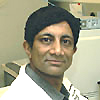|
NCCAM
Seeks Mentors
For
New Fellowship Program
Intramural
scientists interested in mentoring an NCCAM Director’s Fellow are
invited to add their name to a list of potential mentors.
The mentor-fellow
match will be determined by the fellow’s research interest and the
mentor’s willingness to host the fellow, who will be selected in
early 2006 from among NIH and non-NIH applicants. The two-year fellowship,
fully funded by a Prince of Wales Foundation grant, is expected to begin
in summer 2006.
Under the mentor’s
guidance, the fellow will serve as a "bridge" between the mentor’s
intramural lab, where the work will be performed, and NCCAM. The mentor
will supervise the fellow in conducting clinical, translational, and/or
laboratory research as he or she would any other fellow. It is suggested
but not required that this research—whether at the bench or the bedside—be
related to complementary and alternative medicine (CAM).
The intramural lab
that hosts the fellow will need to provide space and the mentor’s
time but will incur no cost in supporting this collaborative opportunity.
The fellowship offers
full salary, benefits, professional travel, and two years of research
support. The selected fellow must have an MD, DO, PhD, DC, ND, or equivalent
degree and be committed to a career in CAM research.
Those interested
in joining a list of available mentors or in recommending a qualified
candidate for this fellowship are encouraged to contact Ruth
Kirschstein, senior advisor to the NIH director.
Fellowship details
are available at the
website.

Town
Hall Meeting on Taking Care of Business
A
Town Hall Meeting to acquaint scientific and administrative staff with
the NIH Business System (NBS) will be held Monday, October 31, 2005,
from 8:00 a.m. to 12:00 noon in the Natcher Auditorium.
The event begins
with a plenary-session discussion of scientific and administrative management
perspectives, followed by a series of concurrent sessions of system demonstrations
in three functional areas: acquisition/supply (iProcurement, Prism &
Oracle Systems), property (Sunflower System), and finance (Oracle System).
Information about
registration will be provided via e-mail closer to the date of the event.
Sign language interpreters will be provided. Individuals with disabilities
who need reasonable accommodation to participate in this conference should
contact Leslie Linden in the NBS Project Office at 301-451-0004 or via
e-mail.

|
On
the NIMH MAP: Manji Named Director
 |
|
Husseini Manji
|
Husseini
Manji,
chief of the Laboratory
of Molecular Pathophysiology in the Mood
and Anxiety Program (MAP), NIMH, has been appointed MAP director.
Manji is a psychiatrist by training, with a special emphasis in psychopharmacology
and cellular and molecular biology.
The major focus
of his ongoing research is the investigation of disease- and treatment-induced
changes in gene and protein expression profiles that regulate neuroplasticity
and cellular resilience in mood disorders.
His laboratories'
scientific goals are to build on recent insights into the signaling pathways
mediating the effects of mood stabilizer to better understand the pathophysiology
of severe mood disorders and to develop improved therapeutics.
The recipient of
numerous distinguished research awards in his field, Manji has also been
honored at NIMH with awards for excellence in clinical care and research,
and Mentor of the Year and Supervisor of the Year awards.
He developed and
directs the NIH Foundation for Advanced
Education in the Sciences graduate course in the neurobiology of mental
illness. He has published extensively on the molecular and cellular underpinnings
of severe mood disorders and their treatments, authored many textbook
chapters, and edited a book on the mechanisms of action of treatments
for bipolar disorder.
He is a councilor
for the Collegium Inter-nationale Neuropsychopharmacologicum and a fellow
of the American College of Neuropsychopharmacology (ACNP); he chairs the
ACNP’s Task Force on New Medication Development, and is a member
of ACNP’s Credentialing Committee.
Manji serves on
the advisory boards of several scientific and research organizations,
is editor of two academic journals, and is a visiting professor in the
Departments of Psychiatry at Columbia University in New York and Duke
University in Durham, N.C. 
|
![]() Health disparities panel discussion (HIV/AIDS, diabetes,
public health, obesity), September 21, 9:00–10:30 a.m., Lipsett
Auditorium, Building 10
Health disparities panel discussion (HIV/AIDS, diabetes,
public health, obesity), September 21, 9:00–10:30 a.m., Lipsett
Auditorium, Building 10![]() WALS Lecture on reducing disparities through health services research,
October 5, 3:00 p.m., Masur Auditorium, Building 10
WALS Lecture on reducing disparities through health services research,
October 5, 3:00 p.m., Masur Auditorium, Building 10![]() The Sixth NIH Hispanic Scientist Day, Wednesday, October 12,
1:30-4:30 p.m., Lipsett Auditorium (keynote on "AIDS vs. Cancer,
Antiretrovirals and Their Consequences," other talks, poster session,
and reception)
The Sixth NIH Hispanic Scientist Day, Wednesday, October 12,
1:30-4:30 p.m., Lipsett Auditorium (keynote on "AIDS vs. Cancer,
Antiretrovirals and Their Consequences," other talks, poster session,
and reception)![]()
![]()
